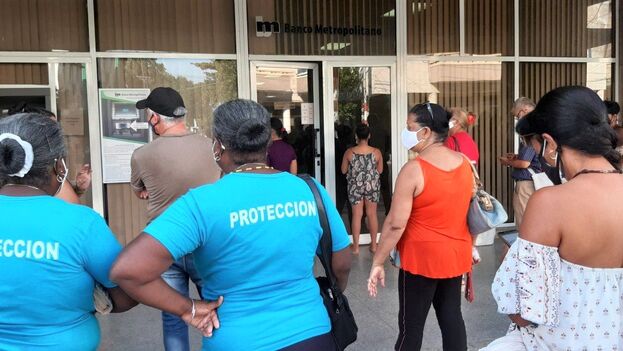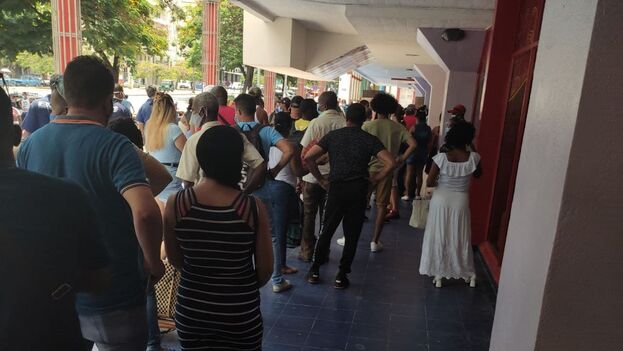
![]() 14ymedio, Juan Diego Rodríguez, Havana, June 11, 2021 — “I deposited everything I had: eighty dollars.” Reinaldo waited in line early Friday morning outside the Banco Metroplitano on Infanta Street in Old Havana to hand over his modest hard-currency fortune that he has been saving for emergencies.
14ymedio, Juan Diego Rodríguez, Havana, June 11, 2021 — “I deposited everything I had: eighty dollars.” Reinaldo waited in line early Friday morning outside the Banco Metroplitano on Infanta Street in Old Havana to hand over his modest hard-currency fortune that he has been saving for emergencies.
Thousands of Cubans like him woke up worried, after learning the night before that the government would suspend cash deposits of dollars on June 21. “What’s the use of having this money if I can’t use it after that date?” a young man in the doorway of the bank asks.
“The bank really planned ahead,” he notes. “Normally there are only two or three tellers available but today everyone was there, ready to take people’s deposits.”
On the TV news/interview program Roundtable, officials described the decision as a necessary step to deal with obstacles created by the U.S. embargo. But the official explanation has failed to convince either ordinary citizens or economists, who expressed astonishment the day after the announcement.
At the end of May, the government suspended currency exchange services at the country’s international airports, claiming it had run out of cash. It indicated that, despite a “significant shortage” of hard currency, it had been able to continue operating within established limits but that a “lack of liquidity” had made those operations unsustainable.
Long lines formed again on Friday outside stores that only accept freely convertible foreign currency, especially those selling home appliances. Outside the Plaza de Carlos III shopping mall in Central Havana, dozens of people were already in line by 5:00 AM, when the pandemic curfew ends, eager to spend their dollars on a refrigerator, air-conditioning system or rice cooker.
“People are going crazy because they’re afraid they’ll be hit with more measures like this in a few days,” says one young man waiting in line to buy clothing at a foreign currency store in the capital’s biggest shopping center. “What this has done is create more doubt and given people the impression that the those at the top don’t know what they’re doing.”

For many the situation has brought back memories of the so-called Houses of Gold and Silver. In the 1980s the government operated stores known as “Houses of Diego Velazquez” — a reference to early Spanish explorers who traded tiny pieces of mirrored glass for gold — in which customers exchanged jewelry, gemstones and precious metal objects for vouchers which could be used to purchase clothing, footwear and household appliances.
No figures were ever released on how much gold and silver was ultimately collected but the operation lives on in the Cuban imagination as a kind of institutional scam, especially since the merchandise bought with the vouchers turned out to be shoddy and wore out quickly.
____________
COLLABORATE WITH OUR WORK: The 14ymedio team is committed to practicing serious journalism that reflects Cuba’s reality in all its depth. Thank you for joining us on this long journey. We invite you to continue supporting us by becoming a member of 14ymedio now. Together we can continue transforming journalism in Cuba.
